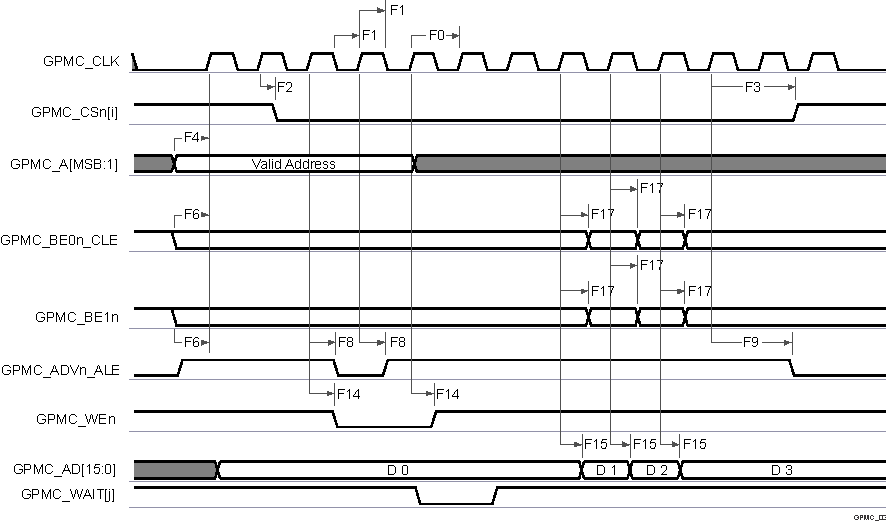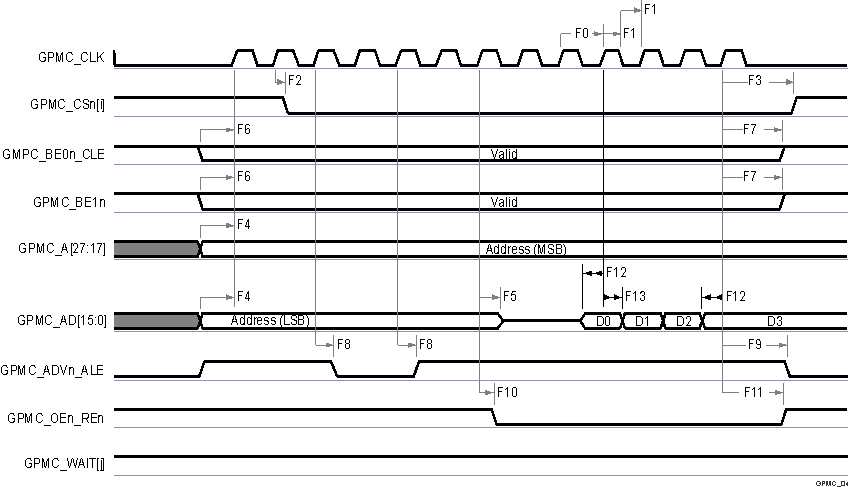ZHCSRW0C February 2023 – November 2025 AM68 , AM68A
PRODUCTION DATA
- 1
- 1 特性
- 2 应用
- 3 说明
- 4 器件比较
-
5 端子配置和功能
- 5.1 引脚图
- 5.2 引脚属性
- 5.3
信号说明
- 13
- 5.3.1 ADC
- 5.3.2 DDRSS
- 5.3.3 GPIO
- 5.3.4 I2C
- 5.3.5 I3C
- 5.3.6 MCAN
- 5.3.7 MCSPI
- 5.3.8 UART
- 5.3.9 MDIO
- 5.3.10 CPSW2G
- 5.3.11 ECAP
- 5.3.12 EQEP
- 5.3.13 EPWM
- 5.3.14 USB
- 5.3.15 显示端口
- 5.3.16 HyperLink
- 5.3.17 PCIE
- 5.3.18 SERDES
- 5.3.19 DSI
- 5.3.20 CSI
- 5.3.21 MCASP
- 5.3.22 DMTIMER
- 5.3.23 CPTS
- 5.3.24 DSS
- 5.3.25 GPMC
- 5.3.26 MMC
- 5.3.27 OSPI
- 5.3.28 Hyperbus
- 5.3.29 仿真和调试
- 5.3.30 系统和其他
- 5.3.31 电源
- 5.4 未使用引脚的连接
-
6 规格
- 6.1 绝对最大额定值
- 6.2 ESD 等级
- 6.3 建议运行条件
- 6.4 通电时间 (POH) 限制
- 6.5 运行性能点
- 6.6 电气特性
- 6.7 一次性可编程 (OTP) 电子保险丝的 VPP 规格
- 6.8 热阻特性
- 6.9 温度传感器特性
- 6.10
时序和开关特性
- 6.10.1 时序参数和信息
- 6.10.2 电源时序控制
- 6.10.3 系统时序
- 6.10.4 时钟规格
- 6.10.5
外设
- 6.10.5.1 ATL
- 6.10.5.2 CPSW2G
- 6.10.5.3 CSI-2
- 6.10.5.4 DDRSS
- 6.10.5.5 DSS
- 6.10.5.6 eCAP
- 6.10.5.7 EPWM
- 6.10.5.8 eQEP
- 6.10.5.9 GPIO
- 6.10.5.10 GPMC
- 6.10.5.11 HyperBus
- 6.10.5.12 I2C
- 6.10.5.13 I3C
- 6.10.5.14 MCAN
- 6.10.5.15 MCASP
- 6.10.5.16 MCSPI
- 6.10.5.17 MMCSD
- 6.10.5.18 CPTS
- 6.10.5.19 OSPI
- 6.10.5.20 PCIE
- 6.10.5.21 计时器
- 6.10.5.22 UART
- 6.10.5.23 USB
- 6.10.6 仿真和调试
- 7 详细说明
- 8 应用、实施和布局
- 9 器件和文档支持
- 10修订历史记录
- 11机械、封装和可订购信息
6.10.5.10.1.2 GPMC 和 NOR 闪存开关特性 - 同步模式
| 编号(2) | 参数 | 说明 | 模式(19) | 最小值 | 最大值 | 最小值 | 最大值 | 单位 |
|---|---|---|---|---|---|---|---|---|
| 100 MHz(20) | 133 MHz(20) | |||||||
| F0 | tc(clk) | 周期,输出时钟 GPMC_CLK(18) | div_by_1_mode; GPMC_FCLK_MUX; TIMEPARAGRANULARITY_X1 | 10 | 7.52 | ns | ||
| F1 | tw(clkH) | 典型脉冲持续时间,输出时钟 GPMC_CLK 高电平 | div_by_1_mode; GPMC_FCLK_MUX; TIMEPARAGRANULARITY_X1 | 0.475*P(15)- 0.3 | 0.475*P(15)- 0.3 | ns | ||
| F1 | tw(clkL) | 典型脉冲持续时间,输出时钟 GPMC_CLK 低电平 | div_by_1_mode; GPMC_FCLK_MUX; TIMEPARAGRANULARITY_X1 | 0.475*P(15)- 0.3 | 0.475*P(15)- 0.3 | ns | ||
| F2 | td(clkH-csnV) | 延迟时间,输出时钟 GPMC_CLK 上升沿到输出片选 GPMC_CSn[i] 转换(14) | div_by_1_mode; GPMC_FCLK_MUX; TIMEPARAGRANULARITY_X1; 无 extra_delay | F(6)- 2.2 | F+3.75 | F(6)- 2.2 | F(6)+ 3.75 | ns |
| F3 | td(clkH-CSn[i]V) | 延迟时间,输出时钟 GPMC_CLK 上升沿到输出片选 GPMC_CSn[i] 无效(14) | div_by_1_mode; GPMC_FCLK_MUX; TIMEPARAGRANULARITY_X1; 无 extra_delay | E(5)- 2.2 | E(5)+ 3.75 | E(5)- 2.2 | E(5)+ 3.75 | ns |
| F4 | td(aV-clk) | 延迟时间,输出地址 GPMC_A[27:1] 有效到输出时钟 GPMC_CLK 第一个边沿 | div_by_1_mode; GPMC_FCLK_MUX; TIMEPARAGRANULARITY_X1 | B(2)-2.3 | B(2)+4.5 | B(2)-2.3 | B(2)+4.5 | ns |
| F5 | td(clkH-aIV) | 延迟时间,输出时钟 GPMC_CLK 上升沿到输出地址 GPMC_A[27:1] 无效 | div_by_1_mode; GPMC_FCLK_MUX; TIMEPARAGRANULARITY_X1 | -2.3 | 4.5 | -2.3 | 4.5 | ns |
| F6 | td(be[x]nV-clk) | 延迟时间,输出低字节使能和命令锁存使能 GPMC_BE0n_CLE、输出高字节使能 GPMC_BE1n 有效到输出时钟 GPMC_CLK 第一个边沿 | div_by_1_mode; GPMC_FCLK_MUX; TIMEPARAGRANULARITY_X1 | B(2)-2.3 | B(2)+1.9 | B(2)-2.3 | B(2)+1.9 | ns |
| F7 | td(clkH-be[x]nIV) | 延迟时间,输出时钟 GPMC_CLK 上升沿到输出低字节使能和命令锁存使能 GPMC_BE0n_CLE、输出高字节使能 GPMC_BE1n 有效(11) | div_by_1_mode; GPMC_FCLK_MUX; TIMEPARAGRANULARITY_X1 | D(4)-2.3 | D(4)+1.9 | D(4)-2.3 | D(4)+1.9 | ns |
| F7 | td(clkL-be[x]nIV) | 延迟时间,GPMC_CLK 下降沿到 GPMC_BE0n_CLE、GPMC_BE1n 无效(12) | div_by_1_mode; GPMC_FCLK_MUX; TIMEPARAGRANULARITY_X1 | D(4)-2.3 | D(4)+1.9 | D(4)-2.3 | D(4)+1.9 | ns |
| F7 | td(clkL-be[x]nIV) | 延迟时间,GPMC_CLK 下降沿到 GPMC_BE0n_CLE、GPMC_BE1n 无效(13) | div_by_1_mode; GPMC_FCLK_MUX; TIMEPARAGRANULARITY_X1 | D(4)-2.3 | D(4)+1.9 | D(4)-2.3 | D(4)+1.9 | ns |
| F8 | td(clkH-advn) | 延迟时间,输出时钟 GPMC_CLK 上升沿到输出地址有效和地址锁存使能 GPMC_ADVn_ALE 转换 | div_by_1_mode; GPMC_FCLK_MUX; TIMEPARAGRANULARITY_X1; 无 extra_delay | G(7)-2.3 | G(7)+4.5 | G(7)-2.3 | G(7)+4.5 | ns |
| F9 | td(clkH-advnIV) | 延迟时间,输出时钟 GPMC_CLK 上升沿到输出地址有效和地址锁存使能 GPMC_ADVn_ALE 无效 | div_by_1_mode; GPMC_FCLK_MUX; TIMEPARAGRANULARITY_X1; 无 extra_delay | D(4)-2.3 | D(4)+4.5 | D(4)-2.3 | D(4)+4.5 | ns |
| F10 | td(clkH-oen) | 延迟时间,输出时钟 GPMC_CLK 上升沿到输出使能 GPMC_OEn_REn 转换 | div_by_1_mode; GPMC_FCLK_MUX; TIMEPARAGRANULARITY_X1; 无 extra_delay | H(8)-2.3 | H(8)+3.5 | H(8)-2.3 | H(8)+3.5 | ns |
| F11 | td(clkH-oenIV) | 延迟时间,输出时钟 GPMC_CLK 上升沿到输出使能 GPMC_OEn_REn 无效 | div_by_1_mode; GPMC_FCLK_MUX; TIMEPARAGRANULARITY_X1; 无 extra_delay | E(8)-2.3 | E(8)+3.5 | E(8)-2.3 | E(8)+ 3.5 | ns |
| F14 | td(clkH-wen) | 延迟时间,输出时钟 GPMC_CLK 上升沿到输出写入使能 GPMC_WEn 转换 | div_by_1_mode; GPMC_FCLK_MUX; TIMEPARAGRANULARITY_X1; 无 extra_delay | I(9)- 2.3 | I(9)+4.5 | I(9)- 2.3 | I(9)+4.5 | ns |
| F15 | td(clkH-do) | 延迟时间,输出时钟 GPMC_CLK 上升沿到输出数据 GPMC_AD[15:0] 转换(11) | div_by_1_mode; GPMC_FCLK_MUX; TIMEPARAGRANULARITY_X1 | J(10)-2.3 | J(10)+2.7 | J(10)-2.3 | J(10)+2.7 | ns |
| F15 | td(clkL-do) | 延迟时间,GPMC_CLK 下降沿到 GPMC_AD[15:0] 数据总线转换(12) | div_by_1_mode; GPMC_FCLK_MUX; TIMEPARAGRANULARITY_X1 | J(10)-2.3 | J(10)+2.7 | J(10)-2.3 | J(10)+2.7 | ns |
| F15 | td(clkL-do) | 延迟时间,GPMC_CLK 下降沿到 GPMC_AD[15:0] 数据总线转换(13) | div_by_1_mode; GPMC_FCLK_MUX; TIMEPARAGRANULARITY_X1 | J(10)-2.3 | J(10)+2.7 | J(10)-2.3 | J(10)+2.7 | ns |
| F17 | td(clkH-be[x]n) | 延迟时间,输出时钟 GPMC_CLK 上升沿到输出低字节使能和命令锁存使能 GPMC_BE0n_CLE 转换(11) | div_by_1_mode; GPMC_FCLK_MUX; TIMEPARAGRANULARITY_X1 | J(10)-2.3 | J(10)+1.9 | J(10)-2.3 | J(10)+1.9 | ns |
| F17 | td(clkL-be[x]n) | 延迟时间,GPMC_CLK 下降沿到 GPMC_BE0n_CLE、GPMC_BE1n 转换(12) | div_by_1_mode; GPMC_FCLK_MUX; TIMEPARAGRANULARITY_X1 | J(10)-2.3 | J(10)+1.9 | J(10)-2.3 | J(10)+1.9 | ns |
| F17 | td(clkL-be[x]n) | 延迟时间,GPMC_CLK 下降沿到 GPMC_BE0n_CLE、GPMC_BE1n 转换(13) | div_by_1_mode; GPMC_FCLK_MUX; TIMEPARAGRANULARITY_X1 | J(10)-2.3 | J(10)+1.9 | J(10)-2.3 | J(10)+1.9 | ns |
| F18 | tw(csnV) | 脉冲持续时间,输出片选 GPMC_CSn[i] 低电平(14) | 读取 | A(1) | A(1) | ns | ||
| 写入 | A(1) | A(1) | ns | |||||
| F19 | tw(be[x]nV) | 脉冲持续时间,输出低字节使能和命令锁存使能 GPMC_BE0n_CLE、输出高字节使能 GPMC_BE1n 低电平 | 读取 | C(3) | C(3) | ns | ||
| 写入 | C(3) | C(3) | ns | |||||
| F20 | tw(advnV) | 脉冲持续时间,输出地址有效和地址锁存使能 GPMC_ADVn_ALE 低电平 | 读取 | K(16) | K(16) | ns | ||
| 写入 | K(16) | K(16) | ns | |||||
(1) 对于单次读取:A = (CSRdOffTime - CSOnTime) × (TimeParaGranularity + 1) × GPMC_FCLK(17)
对于突发读取:A = (CSRdOffTime - CSOnTime + (n - 1) × PageBurstAccessTime) × (TimeParaGranularity + 1) × GPMC_FCLK(17)
对于突发写入:A = (CSWrOffTime - CSOnTime + (n - 1) × PageBurstAccessTime) × (TimeParaGranularity + 1) × GPMC_FCLK(17)
n 是页面突发访问编号。
对于突发读取:A = (CSRdOffTime - CSOnTime + (n - 1) × PageBurstAccessTime) × (TimeParaGranularity + 1) × GPMC_FCLK(17)
对于突发写入:A = (CSWrOffTime - CSOnTime + (n - 1) × PageBurstAccessTime) × (TimeParaGranularity + 1) × GPMC_FCLK(17)
n 是页面突发访问编号。
(2) B = ClkActivationTime × GPMC_FCLK(17)
(3) 对于单次读取:C = RdCycleTime × (TimeParaGranularity + 1) × GPMC_FCLK(17)
对于突发读取:C = (RdCycleTime + (n - 1) × PageBurstAccessTime) × (TimeParaGranularity + 1) × GPMC_FCLK(17)
对于突发写入:C = (WrCycleTime + (n - 1) × PageBurstAccessTime) × (TimeParaGranularity + 1) × GPMC_FCLK(17)
n 是页面突发访问编号。
对于突发读取:C = (RdCycleTime + (n - 1) × PageBurstAccessTime) × (TimeParaGranularity + 1) × GPMC_FCLK(17)
对于突发写入:C = (WrCycleTime + (n - 1) × PageBurstAccessTime) × (TimeParaGranularity + 1) × GPMC_FCLK(17)
n 是页面突发访问编号。
(4) 对于单次读取:D = (RdCycleTime - AccessTime) × (TimeParaGranularity + 1) × GPMC_FCLK(17)
对于突发读取:D = (RdCycleTime - AccessTime) × (TimeParaGranularity + 1) × GPMC_FCLK(17)
对于突发写入:D = (WrCycleTime - AccessTime) × (TimeParaGranularity + 1) × GPMC_FCLK(17)
对于突发读取:D = (RdCycleTime - AccessTime) × (TimeParaGranularity + 1) × GPMC_FCLK(17)
对于突发写入:D = (WrCycleTime - AccessTime) × (TimeParaGranularity + 1) × GPMC_FCLK(17)
(5) 对于单次读取:E = (CSRdOffTime - AccessTime) × (TimeParaGranularity + 1) × GPMC_FCLK(17)
对于突发读取:E = (CSRdOffTime - AccessTime) × (TimeParaGranularity + 1) × GPMC_FCLK(17)
对于突发写入:E = (CSWrOffTime - AccessTime) × (TimeParaGranularity + 1) × GPMC_FCLK(17)
对于突发读取:E = (CSRdOffTime - AccessTime) × (TimeParaGranularity + 1) × GPMC_FCLK(17)
对于突发写入:E = (CSWrOffTime - AccessTime) × (TimeParaGranularity + 1) × GPMC_FCLK(17)
(6) 对于 csn 下降沿(CS 激活):
- 如果 GPMCFCLKDIVIDER = 0:
- F = 0.5 × CSExtraDelay × GPMC_FCLK(17)
- 如果 GPMCFCLKDIVIDER = 1:
- 如果 GPMCFCLKDIVIDER = 2:
(7) 对于 ADV 下降沿(ADV 激活):
对于读取模式下的 ADV 上升沿(ADV 停用):
对于写入模式下的 ADV 上升沿(ADV 停用):
- 如果 GPMCFCLKDIVIDER = 0:
- G = 0.5 × ADVExtraDelay × GPMC_FCLK(17)
- 如果 GPMCFCLKDIVIDER = 1:
- 如果 GPMCFCLKDIVIDER = 2:
对于读取模式下的 ADV 上升沿(ADV 停用):
- 如果 GPMCFCLKDIVIDER = 0:
- G = 0.5 × ADVExtraDelay × GPMC_FCLK(17)
- 如果 GPMCFCLKDIVIDER = 1:
- 如果 GPMCFCLKDIVIDER = 2:
对于写入模式下的 ADV 上升沿(ADV 停用):
- 如果 GPMCFCLKDIVIDER = 0:
- G = 0.5 × ADVExtraDelay × GPMC_FCLK(17)
- 如果 GPMCFCLKDIVIDER = 1:
- 如果 GPMCFCLKDIVIDER = 2:
(8) 对于 OE 下降沿(OE 激活)和 IO DIR 上升沿(数据总线输入方向):
对于 OE 上升沿(OE 停用):
- 如果 GPMCFCLKDIVIDER = 0:
- H = 0.5 × OEExtraDelay × GPMC_FCLK(17)
- 如果 GPMCFCLKDIVIDER = 1:
- 如果 GPMCFCLKDIVIDER = 2:
对于 OE 上升沿(OE 停用):
- 如果 GPMCFCLKDIVIDER = 0:
- H = 0.5 × OEExtraDelay × GPMC_FCLK(17)
- 如果 GPMCFCLKDIVIDER = 1:
- 如果 GPMCFCLKDIVIDER = 2:
(9) 对于 WE 下降沿(WE 激活):
对于 WE 上升沿(WE 停用):
- 如果 GPMCFCLKDIVIDER = 0:
- I = 0.5 × WEExtraDelay × GPMC_FCLK(17)
- 如果 GPMCFCLKDIVIDER = 1:
- 如果 GPMCFCLKDIVIDER = 2:
对于 WE 上升沿(WE 停用):
- 如果 GPMCFCLKDIVIDER = 0:
- I = 0.5 × WEExtraDelay × GPMC_FCLK(17)
- 如果 GPMCFCLKDIVIDER = 1:
- 如果 GPMCFCLKDIVIDER = 2:
(10) J = GPMC_FCLK(17)
(11) 对于 CLK DIV 1 模式,仅限第一次传输。
(12) 半周期;对于 CLK DIV 1 模式,针对初始传输后的所有数据。
(13) GPMC_CLKOUT 的半个周期;对于 CLK DIV 1 模式以外的模式,针对所有数据。GPMC_CLKOUT 从 GPMC_FCLK 进行分频。
(14) 在 GPMC_CSn[i] 中,i 等于 0、1、2 或 3。在 GPMC_WAIT[j] 中,j 等于 0、1、2 或 3。
(15) P = 以 ns 为单位的 GPMC_CLK 周期
(16) 对于读取:K = (ADVRdOffTime - ADVOnTime) × (TimeParaGranularity + 1) × GPMC_FCLK(17)
对于写入:K = (ADVWrOffTime - ADVOnTime) × (TimeParaGranularity + 1) × GPMC_FCLK(17)
对于写入:K = (ADVWrOffTime - ADVOnTime) × (TimeParaGranularity + 1) × GPMC_FCLK(17)
(17) GPMC_FCLK 是通用存储器控制器内部功能时钟周期(以 ns 为单位)。
(18) 与 GPMC_CLK 输出时钟相关的最大和最小频率可在 GPMC 模块中通过设置 GPMC_CONFIG1_i 配置寄存器位字段 GPMCFCLKDIVIDER 进行编程。
(19) 对于 div_by_1_mode:
对于无 extra_delay 的情况:
- GPMC_CONFIG1_i 寄存器:GPMCFCLKDIVIDER = 0h:
- GPMC_CLK 频率 = GPMC_FCLK 频率
- CTRLMMR_GPMC_CLKSEL[1-0] CLK_SEL = 01 = PER1_PLL_CLKOUT/3 = 300/3 = 100 MHz
- GPMC_CONFIG1_i 寄存器:TIMEPARAGRANULARITY = 0h = x1 延迟(影响 RD/WRCYCLETIME、RD/WRACCESSTIME、PAGEBURSTACCESSTIME、CSONTIME、CSRD/WROFFTIME、ADVONTIME、ADVRD/WROFFTIME、OEONTIME、OEOFFTIME、WEONTIME、WEOFFTIME、CYCLE2CYCLEDELAY、BUSTURNAROUND、TIMEOUTSTARTVALUE、WRDATAONADMUXBUS)
对于无 extra_delay 的情况:
- GPMC_CONFIG2_i 寄存器:CSEXTRADELAY = 0h = CSn 时序控制信号不延迟
- GPMC_CONFIG4_i 寄存器:WEEXTRADELAY = 0h = nWE 时序控制信号不延迟
- GPMC_CONFIG4_i 寄存器:OEEXTRADELAY = 0h = nOE 时序控制信号不延迟
- GPMC_CONFIG3_i 寄存器:ADVEXTRADELAY = 0h = nADV 时序控制信号不延迟
(20) 对于 100MHz:
- CTRLMMR_GPMC_CLKSEL[1-0] CLK_SEL = 01 = MAIN_PLL2_HSDIV1_CLKOUT / 3
- CTRLMMR_GPMC_CLKSEL[1-0] CLK_SEL = 00 = MAIN_PLL0_HSDIV3_CLKOUT

A. 在 GPMC_CSn[i] 中,i 等于 0、1、2 或 3。
B. 在 GPMC_WAIT[j] 中,j 等于 0、1、2 或 3。
图 6-53 GPMC 和 NOR 闪存 - 同步单次读取 (GPMCFCLKDIVIDER = 0)
A. 在 GPMC_CSn[i] 中,i 等于 0、1、2 或 3。
B. 在 GPMC_WAIT[j] 中,j 等于 0、1、2 或 3。
图 6-54 GPMC 和 NOR 闪存 - 同步突发读取 - 4x16 位 (GPMCFCLKDIVIDER = 0)
A. 在 GPMC_CSn[i] 中,i 等于 0、1、2 或 3。
B. 在 GPMC_WAIT[j] 中,j 等于 0、1、2 或 3。
图 6-55 GPMC 和 NOR 闪存 - 同步突发写入 (GPMCFCLKDIVIDER = 0)
A. 在 GPMC_CSn[i] 中,i 等于 0、1、2 或 3。
B. 在 GPMC_WAIT[j] 中,j 等于 0、1、2 或 3。
图 6-56 GPMC 和多路复用 NOR 闪存 - 同步突发读取
A. 在 GPMC_CSn[i] 中,i 等于 0、1、2 或 3。
B. 在 GPMC_WAIT[j] 中,j 等于 0、1、2 或 3。
图 6-57 GPMC 和多路复用 NOR 闪存 - 同步突发写入